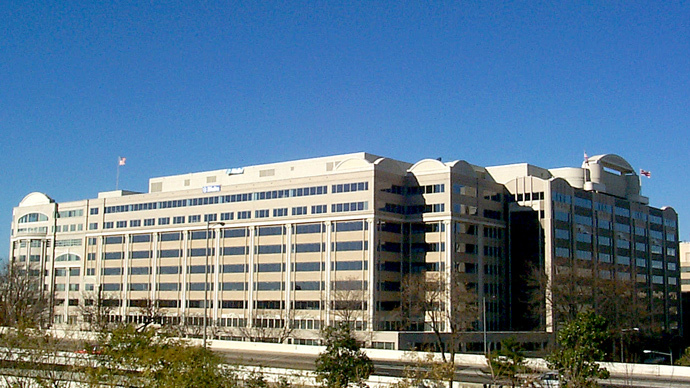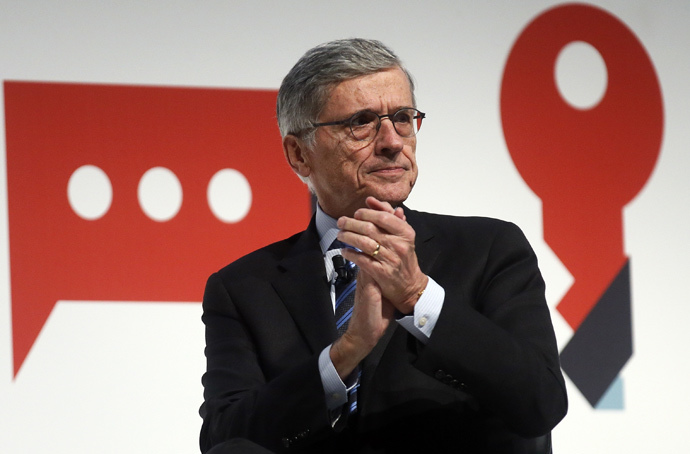FCC outlines net neutrality rules in 400-page report: 5 things you need to know

The Federal Communications Commission on Thursday published a 400-page report containing the open internet rules that the agency's panel moved to adopt last month in a 3-2 vote hailed as a victory by net neutrality advocates.
The report, the FCC says, “once and for all...puts into place strong, sustainable rules, grounded in multiple sources of our legal authority, to ensure that Americans reap the economic, social and civic benefits of an open Internet today and into the future.”
Want to know what that means, but without wrapping your brain around the report's 270,000 or so words? We've outlined a few key takeaways to help explain the FCC's latest release.
No blocking
The FCC says that strong rules are required in order to protect consumers against past and potentially future tactics that would threaten the existence of an open internet, and first on the agency's list is a “no blocking” provision. As one might expect, this rule prohibits internet service providers, or ISPs, from keeping customers from accessing content that isn't against the law.
“A person engaged in the provision of broadband Internet access service, insofar as such person is so engaged, shall not block lawful content, applications, services or non-harmful devices, subject to reasonable network management,” the FCC says.
READ MORE: FCC adopts net neutrality rules endorsed by open internet advocates
In other words, an ISP, such as Comcast or Verizon, for example, can't take action to keep ordinary customers away from certain websites (or stop them from downloading certain movies or music, for that matter), unless the content in question and the act of obtaining it is otherwise illegal. So while the new rules prohibit ISPs from blocking access to blogs that might be critical of their corporations, web service providers can still take action if a customer is somehow caught downloading illegal content.
“[T]he no-blocking rule only applies to transmissions of lawful content and does not prevent or restrict a broadband provider from refusing to transmit unlawful material, such as child pornography or copyright-infringing materials. We believe that this approach will allow broadband providers to honor their service commitments to their subscribers without requiring a specified level of service to those subscribers or edge providers under the no-blocking rule,” the agency says.
Throughout the report, the FCC notes that, notwithstanding rules such as the “no blocking” provision, certain custodial efforts (or “reasonable network management”) might affect access to the internet. As long as the management is reasonable, however, the FCC says it will find no fault.

No throttling
Similarly, the FCC's new rules also say that internet providers can't decide to speed-up and slow-down the delivery to customers of online content at an ISP's own discretion. Adding to open internet rules adopted by the FCC starting in 2010 (and enforced up until a federal court judge told them otherwise, eventually paving way for the release of this report nearly a half-decade later), the agency says this no throttling rule means ISPs can't “degrade lawful Internet traffic on the basis of Internet content, application or service, or use of a non-harmful device, subject to reasonable network management.”
“Degrading access to legal content and services can have the same effect as blocking and will not be permitted,” reads a portion of this week's report.
READ MORE: Republicans aim to reverse landmark net neutrality ruling
According to the FCC, “the ban on throttling is necessary both to fulfill the reasonable expectations of a customer who signs up for a broadband service that promises access to all of the lawful Internet, and to avoid gamesmanship designed to avoid the no-blocking rule by, for example, rendering an application effectively, but not technically, unusable.”
“With the no-throttling rule, we ban conduct that is not outright blocking, but inhibits the delivery of particular content, applications or services, or particular classes of content, applications or services.”
Once again, though, illegal content isn't covered by the FCC's “no throttling” provision, meaning the agency's new rules won't stop ISPs from adjusting the connection speeds of customers caught sharing copywrited material, as RT previously reported.
No paid prioritization
Ahead of the FCC's decision last month to adopt the rules released in this week's report, a hot topic among commentators watching the debate was whether the agency would allow for paid prioritization; that is, whether ISPs should be able to cut deals with content creators in which the delivery of web traffic, specifically with regards to the speed, could differ depending on how much those content creators chose to pay.
“Paid prioritization occurs when a broadband provider accepts payment (monetary or otherwise) to manage its network in a way that benefits particular content, applications, services or devices,” the FCC says, and allowing for it would indeed enable the creation of “fast lanes” feared by net neutrality advocates.
“To protect against 'fast lanes,' this Order adopts a rule that establishes that: A person engaged in the provision of broadband Internet access service, insofar as such person is so engaged, shall not engage in paid prioritization,” reads another one of the FCC's new rules.
Along with no blocking and no throttling, the FCC says this this provision is one of three “clear, bright-line rules” necessary to preserve net neutrality.
Well, almost no paid prioritization
Yet while paid prioritization and “fast lanes” became a central argument to the net neutrality debate, the FCC has included language in its report that doesn't outright ban that concept 100 percent. According to the FCC, the ban on paid prioritization may be waived “only if the petitioner demonstrates that the practice would provide some significant public interest benefit and would not harm the open nature of the Internet.”
In order to demonstrate as much, the FCC says that the applicant “must demonstrate that the practice will have some significant public interest benefit,” and explain how it wouldn’t harm the concept of net neutrality.
According to the rules, “An applicant seeking waiver relief under this rule faces a high bar.”
“We anticipate granting such relief only in exceptional cases,” wrote the commissioned.

Regulations won't restrict law enforcement
Speaking of exceptional cases, the FCC made sure to include language in this week's report that reiterates the importance of ensuring authorities can bypass open internet protections adopted through the ruling for the sake of law enforcement operations.
“The record is generally supportive of our proposal to reiterate that open Internet rules do not supersede any obligation a broadband provider may have – or limit its ability – to address the needs of emergency communications or law enforcement, public safety, or homeland or national security authorities,” the FCC says. According to the report, broadband providers have obligations under statutes such as the Communications Assistance for Law Enforcement Act (CALEA), the Foreign Intelligence Surveillance Act (FISA) and the Electronic Communications Privacy Act (ECPA) that "could in some circumstances intersect with open Internet protections," given that access must always be prioritized "in order to coordinate disaster relief and other emergency response efforts, or for other emergency communications.”
READ MORE: Net neutrality protests planned across US ahead of FCC decision
“Most commenters recognize the benefits of clarifying that these obligations are not inconsistent with open Internet rules” the FCC says.
Privacy advocates have raised questions in recent years about the scope of laws like CALEA, FISA and ECPA, however, especially given statements from government officials concerning ways in which authorities may rely on certain legislation to conduct online eavesdropping.
RT reported at the time that a Justice Department attorney said in 2013 that the government wants to use CALEA to monitor the online conversations of suspected criminals in real time, and disclosures that same year from former intelligence contractor Edward Snowden revealed that the government uses Section 702 of FISA to authorize digital surveillance on foreign persons – the likes of which, tech experts have argued, has involved exploiting security weaknesses on behalf of the government and, as a result, secretly undermining the protocols meant to protect online activity.
The language in the report doesn’t provide any new powers to law enforcement, but rather clarifies that open internet provisions shouldn't in any way preclude the authorities’ already established abilities.











